A new group called the American Solar Manufacturers Against Chinese Circumvention (A-SMACC), represented by D.C. law firm Wiley, has filed a petition with the Department of Commerce, asking the department to investigate Chinese silicon solar panel manufacturing companies working in Malaysia, Thailand and Vietnam as a way to avoid antidumping and countervailing (AD/CV) duties.
AD/CV duties have been in place against Chinese solar manufacturers since 2012. Any silicon solar cell imports from China come with an extra tax from the Dept. of Commerce. Some Chinese companies, in a possible attempt to avoid paying the tax, have moved portions of their manufacturing capacity to other Southeast Asian countries.
This latest petition is asking for a deeper look into specific companies working in the three mentioned countries:
- Malaysia: JinkoSolar, LONGi (and affiliates), JA Solar
- Thailand: Canadian Solar, Trina Solar, Talesun Solar, Astroenergy
- Vietnam: Trina Solar, Canadian Solar, Sunergy, Boviet Solar, GCL, LONGi (and affiliates), JinkoSolar
A-SMACC released a statement through Wiley:
While Chinese companies now almost exclusively export to the United States from Southeast Asia, the vast majority of manufacturing, research and development, and capital investment remain in China. In cases like this the law is clear; the duties on Chinese solar products should be extended to circumventing entities. Otherwise, it is likely that our industry will succumb to monopoly control, our energy security will be at risk, and the Biden Administration’s goal to Build Back Better with clean energy manufacturing will be gravely imperiled.
The companies involved with A-SMACC and the petition have chosen to remain anonymous. The petition has not yet been made public by the Dept. of Commerce.
Industry trade group SEIA sent a message to its members that the group will “aggressively oppose” an assessment of the duties.
“While we are still assessing the potential impact of these petitions, the disruption to the U.S. solar market could be severe,” said SEIA president and CEO Abigail Ross Hopper in an email.
Read more about the decade-long solar tariff battle between the United States and China here.
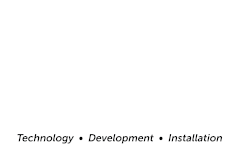
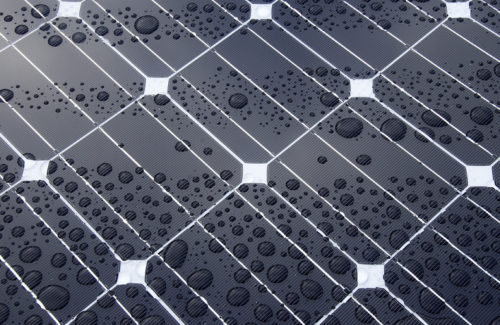
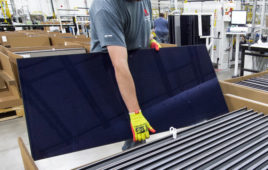
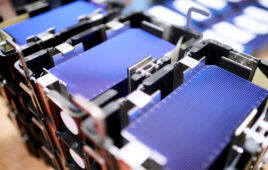
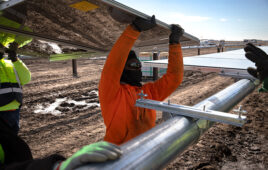
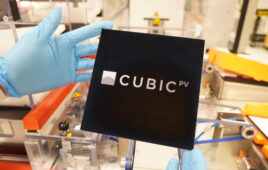
With us car manufactures bumping $90/ hour, it is impossible to compete in a world economy. The only thing that can solve that dilemma is cheaper US wages and an overhaul of representative government.
Yeah, China doesn’t need the U.S. for market share. There are still plenty of countries around the World that will buy Chinese panels in manufacturing runs of 100,000 to perhaps 1,000,000 panels at $0.16/watt, perhaps less in these large quantities. It won’t be easy, but the U.S. can find ways to manufacture solar PV panels cheaper, faster with superior quality and higher manufacturing yield without faults in the manufacturing line. As the entire industry swells with manufacturing prowess, the U.S. needs to get the memo that solar PV manufacturing is not about the panel on the output line, it is price point, product longevity, energy used for end to end processing of solar PV panel components, but costs also entrained in recycling used and broken panels to retrieving materials to use in a new panel manufacturing line.
“Today’s filing will ensure that the playing field for American solar manufacturing is level and ready for the scaled investments necessary to address climate change. For too long, obvious circumvention of antidumping and countervailing duties on Chinese solar products has hobbled the U.S. industry, eviscerated our supply chains, and put our clean energy future at risk. It is time for America to lead in this critical sector. This targeted enforcement action ensures that the United States’ status as an innovation and manufacturing leader will not be endangered by exploitative trade practices that harm the American worker.”
“… eviscerated our supply chains,…”, Corporate America has done this as the Chinese have a better plan than “offshoring” facilities in the name of profits, for gaining benefits in corporate taxes. So, the REC foundry in Washington State was a going concern using cheap hydro-electric power to run manufacturing in the facility. In one article, there was a boast that the REC plant could actually manufacture two years worth of cells in one year. Being ahead while upgrading a product line to increase output without missing a beat would be a good thing, so what happened to all of these Grandiose plans?
So, we’re expanding the trade war to include Malaysia, Thailand and Vietnam, now? Smart.